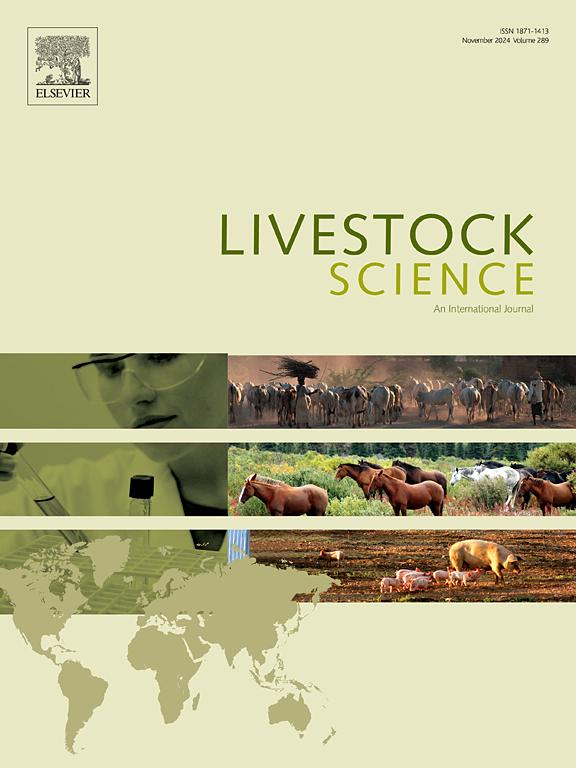评价木基饲料添加剂作为氧化锌替代品:对断奶仔猪生长、抗氧化和炎症状态以及肠道完整性的影响
IF 1.9
3区 农林科学
Q2 AGRICULTURE, DAIRY & ANIMAL SCIENCE
引用次数: 0
摘要
从2022年7月起,欧盟禁止在动物饲料中添加治疗剂量的氧化锌(ZnO),这引发了人们对具有抗氧化和抗炎特性的替代膳食补充剂的兴趣。本研究考察了在前饲料和前饲料中添加富含木脂素和酚酸的木基饲料补充剂对仔猪断奶后生长性能和肠道完整性的影响。试验选用126头仔猪,随机分为3组:在前料饲粮中分别添加或不添加高剂量氧化锌(锌含量超过2500 mg/kg vs 150 mg/kg)的阳性对照(PC)和阴性对照(NC)饲粮,以及添加1500 mg/kg木基添加剂(WBS)的饲粮。断奶后每周评估生长参数。此外,在第14天采集血液和粪便样本,分析抗氧化参数、急性期蛋白和与肠道完整性和免疫反应相关的基因表达。不同饲粮处理的饲料系数无显著差异。但PC和WPS仔猪采食量高于NC仔猪。WPS仔猪的生长速度中等,与对照组无显著差异。与NC组相比,PC组的il - 1β、IFNα、TNFα和occludin的相对定量较高,而WBS组则处于中等水平。总体而言,该研究表明,在断奶仔猪的日粮中添加木基添加剂有望促进采食量的增加和适度的抗炎活性,可能减轻断奶后早期禁用治疗水平氧化锌造成的产量损失。本文章由计算机程序翻译,如有差异,请以英文原文为准。
Evaluation of a wood-based feed supplement as an alternative to zinc oxide: Effects on growth, antioxidant and inflammatory status, and gut integrity in weaned piglets
From July 2022, the European Union banned therapeutic doses of zinc oxide (ZnO) in animal feed, prompting interest in alternative dietary supplements with antioxidant and anti-inflammatory properties. The study examined the effects of adding a wood-based feed supplement, rich in lignans and phenolic acids, to pre-starter and starter diets on piglet growth performance and intestinal integrity post-weaning. A total of 126 piglets were randomly assigned to three treatments: positive control (PC) and negative control (NC) diets with or without high doses of ZnO in the pre-starter diet (Zn levels exceeding 2500 mg/kg vs. 150 mg/kg), and a diet containing a wood-based supplement (WBS) at a dosage of 1500 mg/kg. Growth parameters were assessed weekly during the post-weaning period. Moreover, blood and fecal samples were collected at 14 days to analyze antioxidant parameters, acute phase proteins, and gene expression related to gut integrity and immune response. No differences in feed conversion ratio were observed among dietary treatments. However, PC and WPS piglets had higher feed intake than those from NC. The growth rate in WPS piglets was intermediate and not different from both control groups. The PC group showed higher relative quantification for IL1β, IFNα, TNFα and occludin than the NC group, whereas piglets fed WBS treatment showed intermediate figures. Overall, the study suggests that dietary inclusion of the wood-based supplement showed promise in promoting increased feed intake and moderate anti-inflammatory activity in weaned piglets, potentially mitigating production losses resulting from the ban on therapeutic levels of ZnO in the early post-weaning period.
求助全文
通过发布文献求助,成功后即可免费获取论文全文。
去求助
来源期刊

Livestock Science
农林科学-奶制品与动物科学
CiteScore
4.30
自引率
5.60%
发文量
237
审稿时长
3 months
期刊介绍:
Livestock Science promotes the sound development of the livestock sector by publishing original, peer-reviewed research and review articles covering all aspects of this broad field. The journal welcomes submissions on the avant-garde areas of animal genetics, breeding, growth, reproduction, nutrition, physiology, and behaviour in addition to genetic resources, welfare, ethics, health, management and production systems. The high-quality content of this journal reflects the truly international nature of this broad area of research.
 求助内容:
求助内容: 应助结果提醒方式:
应助结果提醒方式:


